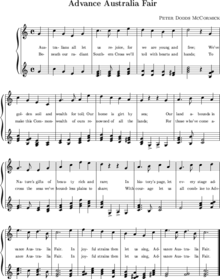Advance Australia Fair facts for kids
 |
|
| National anthem of | Australia |
|---|---|
| Lyrics | Peter Dodds McCormick, November 1878 |
| Music | Peter Dodds McCormick, November 1878 |
| Adopted | 9 April 1974 |
"Advance Australia Fair" is the national anthem of Australia. An anthem is a special song that represents a country. This song was written by Peter Dodds McCormick, who was born in Scotland. It was first sung in 1878 as a patriotic song, meaning a song that shows love for one's country.
It became Australia's official national anthem in 1974, replacing "God Save the Queen". This change happened after a survey across the country. "God Save the Queen" was brought back in 1976. However, in 1977, Australians voted again in a special poll called a plebiscite. They chose "Advance Australia Fair" once more, and it became the anthem again in 1984.
"God Save the Queen" is now known as the royal anthem. It is played when the Queen or other members of the Royal Family are at public events in Australia. The version of "Advance Australia Fair" adopted in 1984 has different lyrics from McCormick's original. It also has two verses instead of four. In January 2021, the lyrics were changed slightly again.
Contents
History of the Australian Anthem
How "Advance Australia Fair" Began
"Advance Australia Fair" was created in the late 1800s by Peter Dodds McCormick. He used the pen-name "Amicus," which means "friend" in Latin. The song was first performed in Sydney on November 30, 1878. It quickly became popular.
A changed version was sung by a huge choir of about 10,000 people. This happened when the Commonwealth of Australia was officially formed on January 1, 1901. In 1907, the Australian Government gave McCormick £100 for his song.
McCormick once wrote about how he was inspired to create the song. He said he went to a concert where national anthems from around the world were sung. He felt sad that there was no song for Australia. On his way home, he thought of the first verse. When he got home, he wrote the music. He said it felt like an inspiration, and he wrote the words and music very easily.
Before it became the national anthem, "Advance Australia Fair" was used in many ways. For example, the Australian Broadcasting Commission played it before news bulletins until 1952. It was also often played at the start or end of official events.
Choosing the National Song
Until 1974, "God Save the Queen" was Australia's national anthem. In 1973, the government led by Gough Whitlam decided Australia needed its own unique anthem. They started a competition called the "Australian National Anthem Quest."
The competition offered prizes for new lyrics and music. However, none of the new entries were chosen. Instead, the songs "Advance Australia Fair," "Waltzing Matilda," and "Song of Australia" were suggested.
In 1974, the Whitlam government asked 60,000 people across Australia which song they preferred. "Advance Australia Fair" was chosen. It became the national song for most events, except those specifically for the Royal Family.
In 1976, the government led by Malcolm Fraser brought "God Save the Queen" back for royal events. They also planned another national vote to find a song for Australian identity. This vote happened in 1977 as part of a larger national vote.
"Advance Australia Fair" received the most votes, with 43.29%. "Waltzing Matilda" came second, and "Song of Australia" and "God Save the Queen" received fewer votes.
On April 19, 1984, "Advance Australia Fair" officially became the Australian national anthem. This was done by the Governor-General, Ninian Stephen, on the advice of the government led by Bob Hawke. "God Save the Queen" is still played at events with the Royal Family.
Lyrics of the Anthem
The official lyrics of "Advance Australia Fair" were adopted in 1984. They have two verses:
|
|
Changes to the Lyrics
Since the song was first written in 1879, its lyrics have changed several times. These changes were often made to make the anthem more inclusive for everyone. The original song had four verses. When it became the national anthem, it was shortened to two verses.
The first verse was mostly kept the same, but the line "Australia's sons let us rejoice" was changed to "Australians all let us rejoice." This made the song include everyone, not just men. The other original verses were replaced with a modified version of a verse sung at the 1901 Federation.
Copyright Information
The original lyrics by Peter Dodds McCormick are no longer protected by copyright because he passed away in 1916. However, the Commonwealth of Australia owns the copyright for the official lyrics and specific musical arrangements of the anthem.
You can use the anthem for non-commercial purposes without special permission. But if you want to use it for commercial reasons, you need to ask the Australian government for permission.
Orchestral Version of the Anthem
The instrumental version of "Advance Australia Fair" that you often hear at international sporting events, like when Australians win medals, was arranged by Tommy Tycho. He was an immigrant from Hungary. This version was first created in 1984 and was shown on TV in 1986.
Criticism of the Anthem
Some people have criticized both the words and the music of "Advance Australia Fair." They say it can be a bit boring or hard to understand. For example, a politician named Sandy Macdonald once said the song was so boring it might make people fall asleep.
One specific criticism is about the line "our home is girt by sea." The word "girt" is an old-fashioned word meaning "surrounded." Some people think this word makes the anthem sound old, especially since the rest of the song uses more modern language.
See also
 In Spanish: Advance Australia Fair para niños
In Spanish: Advance Australia Fair para niños
 | Selma Burke |
 | Pauline Powell Burns |
 | Frederick J. Brown |
 | Robert Blackburn |

